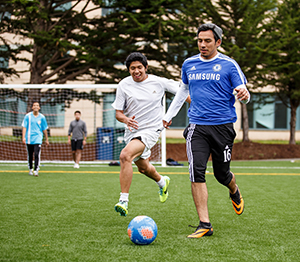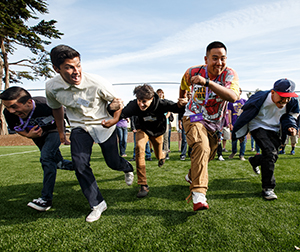Summer session 2015: More classes, lower cost for most students
This summer, SF State students will have something to celebrate: For most, enrollment in summer session courses will be less expensive than in previous years.

Summer session will be offered as part of the state-supported general fund instead of through the College of Extended Learning this year, said Jo Volkert, senior associate vice president for enrollment management. This change means that fees will be less expensive for most students, depending on the number of units they sign up for. Those who qualify for a State University Grant (SUG) as part of their financial aid -- approximately 25 percent of the student body -- will only pay local fees of $185, no matter how many units they take. Students must register for at least six units to use their eligibility for a SUG.
"It's an incredible opportunity for many of our students to earn valuable units toward graduation for less than $200," Volkert said. "This is huge for students, and we are hoping that they will take advantage."
Another benefit of summer session is that it presents the opportunity to enroll in classes that can be difficult to get into during the academic year. "We set up the class schedule for summer so that the courses that are offered are the courses students need," Volkert said. "For people who perhaps couldn't get a particular course during the fall or spring semester, the hope is that they will find it in the summer and be able to graduate faster."

More than 600 classes will be offered this year, a 20 percent increase over last year, Volkert said. The schedule will include, for example, courses that satisfy graduate writing requirements or are required by majors for graduation. The change in summer session is expected to help improve SF State's six-year graduation rates as part of a California State University-wide graduation initiative.
Classes will be available in four sessions, lasting five, eight and ten weeks: June 8 – July 10, June 22 – Aug. 14, July 13 – Aug. 14 and June 8 – Aug. 14. The full schedule of Summer Session courses is now available online, and registration will open on April 6. Priority registration is given to current SF State students, but classes are also open to members of the public, who can register through Open University.
Previously, summer session fees were calculated on a per-unit basis. An additional fee of $372 per unit is applicable for non-resident students.
In addition to speeding up the path to graduation, the concentrated nature of summer courses has academic benefits. "The short sessions enable a student to really focus on the subject matter," Volkert said. "Classes tend to be smaller so you get to know the faculty, and your focus on a project is not interrupted by other classes. It becomes almost like an intense seminar."

On-campus housing is also available to summer students for their convenience, Volkert added.
Outside of the classroom, SF State is ideally positioned to offer a fun summer experience, with most San Francisco attractions within a 30-minute Muni ride, Volkert said. Among many summertime events, students can enjoy free concerts at nearby Stern Grove, march with the SF State contingent in the Pride Parade, visit the San Francisco Zoo or take in a Giants game at AT&T Park, home to this year's commencement ceremony.
For more information about Summer Session, visit http://www.sfsu.edu/~admisrec/summer/index.html
-- Beth Tagawa